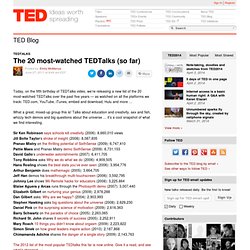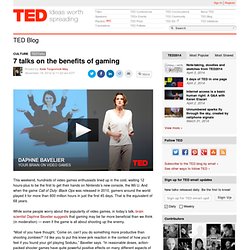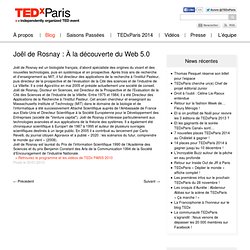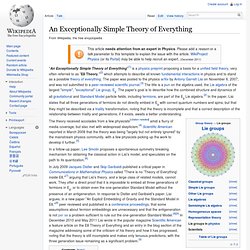

Tim Berners-Lee: The year open data went worldwide. Clay Shirky: How cognitive surplus will change the world. Ken Robinson says schools kill creativity. Evgeny Morozov: How the Net aids dictatorships. Kevin Kelly on the next 5,000 days of the web. Dan Pink on the surprising science of motivation. Chris Anderson: How web video powers global innovation. Marcin Jakubowski: Open-sourced blueprints for civilization.
Oser traverser les frontières: Anjuli Pandit at TEDxParis 2012. Philip Zimbardo shows how people become monsters ... or heroes. James B. Glattfelder : Qui contrôle le monde ? Rethinking Poverty. Michael Pritchard's water filter turns filthy water drinkable. What we learned from 5 million books. The 20 most-watched TED Talks to date.
TEDTalks.

29 Great TED Talks to Engage Your Brain. The most watched and most highly-rated TED talks at the moment. Greatest Hits of TED Videos. The 20 most-watched TEDTalks (so far) Today, on the fifth birthday of TEDTalks video, we’re releasing a new list of the 20 most-watched TEDTalks over the past five years — as watched on all the platforms we track: TED.com, YouTube, iTunes, embed and download, Hulu and more … What a great, mixed-up group this is!

Talks about education and creativity, sex and fish, whizzy tech demos and big questions about the universe … it’s a cool snapshot of what we find interesting. Hans Rosling shows the best stats you've ever seen. Sugata Mitra: The child-driven education. Bunker Roy: Learning from a barefoot movement. Daniel Tammet: Different ways of knowing. Temple Grandin: The world needs all kinds of minds. Mark Pagel: How language transformed humanity. Derek Sivers: Weird, or just different? Jill Bolte Taylor's stroke of insight.
Howard Rheingold on collaboration. Les neurones de l'emphatie. Jeremy Rifkin on "the empathic civilization" Stephen Wolfram: Computing a theory of everything. Web Resources. Stephen Wolfram: A New Kind of Science. Wolfram Demonstrations Project. Jane McGonigal: Gaming can make a better world. 7 fascinating TED Talks on the benefits of gaming. This weekend, hundreds of video games enthusiasts lined up in the cold, waiting 12 hours-plus to be the first to get their hands on Nintendo’s new console, the Wii U.

And when the game Call of Duty: Black Ops was released in 2010, gamers around the world played it for more than 600 million hours in just the first 45 days. That is the equivalent of 68 years. While some people worry about the popularity of video games, in today’s talk, brain scientist Daphne Bavelier suggests that gaming may be far more beneficial than we think (in moderation) — even if the game is all about shooting up the enemy. “Most of you have thought, ‘Come on, can’t you do something more productive than shooting zombies?’
I’d like you to put this knee-jerk reaction in the context of how you’d feel if you found your girl playing Soduku,” Bavelier says. Joël de Rosnay : À la découverte du Web 5.0. Joël de Rosnay est un biologiste français, d’abord spécialiste des origines du vivant et des nouvelles technologies, puis en systémique et en prospective.

Garrett Lisi on his theory of everything. Elementary Particle Explorer. Welcome to the Elementary Particle Explorer, designed by Garrett Lisi and Troy Gardner.

Every known elementary particle is identified by its charges with respect to the electromagnetic, weak, strong, and gravitational forces. Electrons have electric charge -1, up quarks 2/3, down quarks -1/3, and neutrinos 0, with antiparticles having opposite electric charges. In the Standard Model, as you are about to see, these electric charges are a combination of the particles' hypercharge, Y, and weak charge, W. The Elementary Particle Explorer (EPE) allows you to rotate in charge space (by dragging the image), showing the charges of all known particles.
Click on them to see how they are allowed to interact, according to charge conservation. Processing - Please Wait. "An Exceptionally Simple Theory of Everything"[1] is a physics preprint proposing a basis for a unified field theory, very often referred to as "E8 Theory,"[2] which attempts to describe all known fundamental interactions in physics and to stand as a possible theory of everything.

The paper was posted to the physics arXiv by Antony Garrett Lisi on November 6, 2007, and was not submitted to a peer-reviewed scientific journal.[3] The title is a pun on the algebra used, the Lie algebra of the largest "simple", "exceptional" Lie group, E8. The theory received accolades from a few physicists[citation needed] amid a flurry of media coverage, but also met with widespread skepticism.[4] Scientific American reported in March 2008 that the theory was being "largely but not entirely ignored" by the mainstream physics community, with a few physicists picking up the work to develop it further.[5] Overview[edit] Non-technical overview[edit]
Garrett Lisi. Pranav Mistry: The thrilling potential of SixthSense technology. Pranav Mistry. Johnny Lee demos Wii Remote hacks. Kevin Kelly tells technology's epic story. Derek Sivers: How to start a movement. Matt Ridley: When ideas have sex. Steven Johnson: Where good ideas come from. Jared Diamond on why societies collapse.